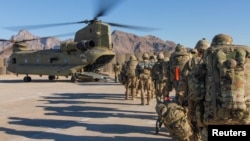President Donald Trump and his national security team had an hourlong, classified meeting on Afghanistan on Friday, a day after a top Afghan official openly complained that the Trump administration was keeping his government in the dark about its negotiations with the Taliban.
The meeting at the Pentagon included Vice President Mike Pence, Secretary of State Mike Pompeo, CIA Director Gina Haspel and Trump's national security adviser, John Bolton, among others. The session was a classified briefing about Afghanistan, according to a White House official who spoke on condition of anonymity to discuss the subject of the private briefing.
The Pentagon has been developing plans to withdraw up to half of the 14,000 troops still in Afghanistan. Patrick Shanahan, acting secretary of defense, said he has no orders to reduce the U.S. troop presence, although officials say that is at the top of the Taliban's list of demands in exploratory peace negotiations.
U.S. Special Representative Zalmay Khalilzad, the administration's main negotiator with the Taliban, recently concluded a 13-day session with leaders of the insurgent group to try to find a way to end the 17-year war.
Draft accords
Khalilzad said the two sides reached two ``draft agreements'' covering the withdrawal of U.S. troops and guarantees that Afghanistan would not revert to a haven for terrorists. But he was unable to persuade the Taliban to launch talks with the Afghan government.
The two sides seem to be in agreement about the withdrawal of American forces, but divided over the timeline and whether a residual force would remain.
Taliban officials have told The Associated Press that the insurgents want a full withdrawal within three to five months, but that U.S. officials say it will take 18 months to two years. The Americans are likely to insist on a residual U.S. force to guard the American Embassy and other diplomatic facilities, and may press for a counterterrorism force as well.
Afghan National Security Adviser Hamdullah Mohib visited Washington on Thursday to publicly complain that the Trump administration has alienated the Afghan government, legitimized the militant network and is crafting a deal that will never lead to peace. His blunt remarks prompted a scolding from State Department officials.
Mohib, the former Afghan ambassador to the United States, said talks about withdrawing troops should be conducted with the Afghan government, which has a bilateral security agreement with the U.S. He also suggested that the negotiations conducted by Khalilzad, a veteran American diplomat who was born in Afghanistan, are clouded by Khalilzad's political ambitions to lead his native country.




